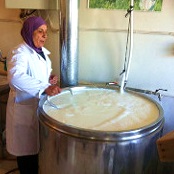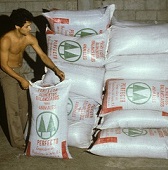Food loss and waste
Around one-third of the food we produce is not consumed. A significant amount of energy inputs are embedded in these losses. In developing countries, most food losses occur during harvest and storage. For this reason, improving post-harvest activities in developing countries is an important way to increase farmers’ incomes.
Food losses are often caused by a lack of access to energy for adequate post-harvesting operations, such as drying, storage and processing, as well as a lack of transportation and distribution. FAO is contributing to increasing the knowledge base in this area and transferring suitable post-harvest technologies for storage and drying to developing countries.
As part of its work in this area, FAO has developed a web-based Information Network on Post-harvest Operations (INPhO) that provides information on a wide range of post-harvest issues. Work carried out by FAO and collaborating donor agencies on reducing post-harvest losses have led to the installation or construction of more than 60 000 metallic silos in 16 countries.
More than 1 500 professionals, technicians and craftsmen have been trained in the construction and handling of these silos. In addition, FAO has set up revolving funds and loans to facilitate the diffusion of better storage technologies and make them more accessible to small farmers who cannot afford them.
FAO is now considering another critical aspect of post-harvest operations, the drying process, with a focus on the energy implications of various drying technologies. The objective is to identify energy-efficient, affordable drying technologies that can work in rural settings.
Small- and medium-scale food processing operations
 FAO supports research for, and establishment of, small- and medium-scale food processing industries. The emphasis has been on food preservation in rural and semi-urban areas, on small-scale, labour-intensive industries with low-cost available materials available.
FAO supports research for, and establishment of, small- and medium-scale food processing industries. The emphasis has been on food preservation in rural and semi-urban areas, on small-scale, labour-intensive industries with low-cost available materials available.
Specific energy-related activities include a programme operating in 35 African countries to support the local construction of fuel-efficient smoking ovens and the introduction of insulated storage containers that can preserve ice longer.
FAO provides information on viable small-scale processing technologies for milk and traditional dairy products from a range of animal species in the different regions, and has carried out a study on the utilization of renewable energy sources and energy-saving technologies by small-scale milk plants and collection centres.
By-products, residues and waste for energy production
 Another factor that influences the development of the agrifood industry is the need to manage industrial by-products, residues and wastes in an environmentally sound way. One management option is to use industrial wastes to produce bioenergy. FAO works to develop and adopt production systems that are productive, sustainable and leave the lightest possible environmental footprint. The Organization’s activities in this area include investigating the energy recovery from the treatment of processed waste from food factories.
Another factor that influences the development of the agrifood industry is the need to manage industrial by-products, residues and wastes in an environmentally sound way. One management option is to use industrial wastes to produce bioenergy. FAO works to develop and adopt production systems that are productive, sustainable and leave the lightest possible environmental footprint. The Organization’s activities in this area include investigating the energy recovery from the treatment of processed waste from food factories.
FAO has developed or contributed to three tools that help in assessing the potential and impacts of the use of agrifood residues for energy.
